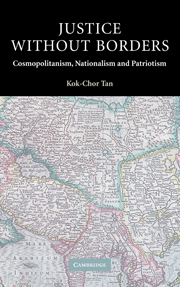9 - Nationality and justice
Published online by Cambridge University Press: 22 September 2009
Summary
As I noted in the previous chapter, one common view in contemporary theories of citizenship, which is gaining an increasing number of adherents, is that a shared nationality provides the crucial common denominator for a functioning liberal democratic citizenship. While this acknowledgment of the connection between nationality and democratic citizenship has come to the fore only comparatively recently in contemporary debate, the importance of common nationality for democratic citizenship was recognized by earlier liberals. J. S. Mill, for instance, famously wrote: “Free institutions are next to impossible in a country made up of different nationalities. Among a people without fellow-feeling, especially if they read and speak different languages, the united public opinion, necessary to the working of representative government, cannot exist” (Mill 1977a, p. 547).
Along the lines suggested in this quotation from Mill, contemporary nationalist theorists argue that a national culture provides the sense of membership that undergirds a common citizenship or membership in a state. This shared identity provides the historical “ties that bind” an otherwise diverse and pluralistic population (Kymlicka 1995, chap. 9). Common nationality provides the collective pride and humiliation, the common history, and the common sympathies that provide the motivation for individuals to establish, and participate in, common political institutions together (cf. Mill 1977a, pp. 546–8). To share a nationality is to share an understanding or vision of where one fits in historically and culturally in the story of humanity, and to share a cultural framework within which one formulates, pursues, evaluates and revises one's purposes and goals in life (Kymlicka 1989, 1995; Miller 1995; Tamir 1992).
- Type
- Chapter
- Information
- Justice without BordersCosmopolitanism, Nationalism, and Patriotism, pp. 180 - 197Publisher: Cambridge University PressPrint publication year: 2004



